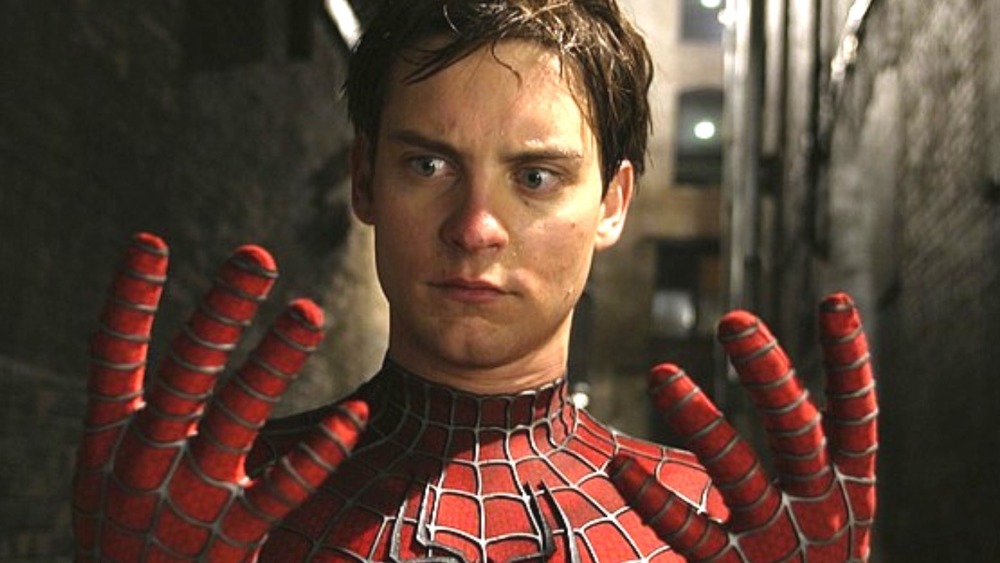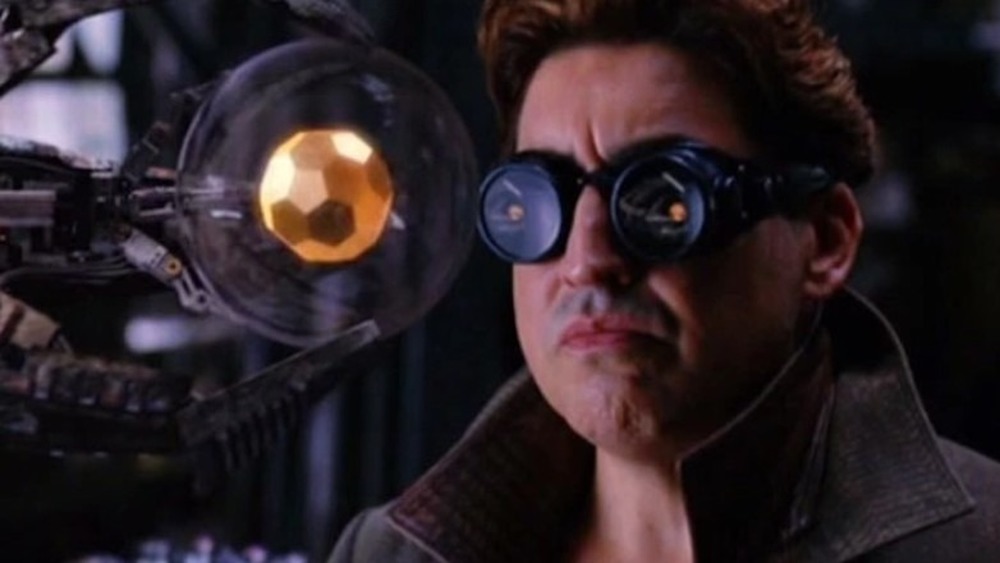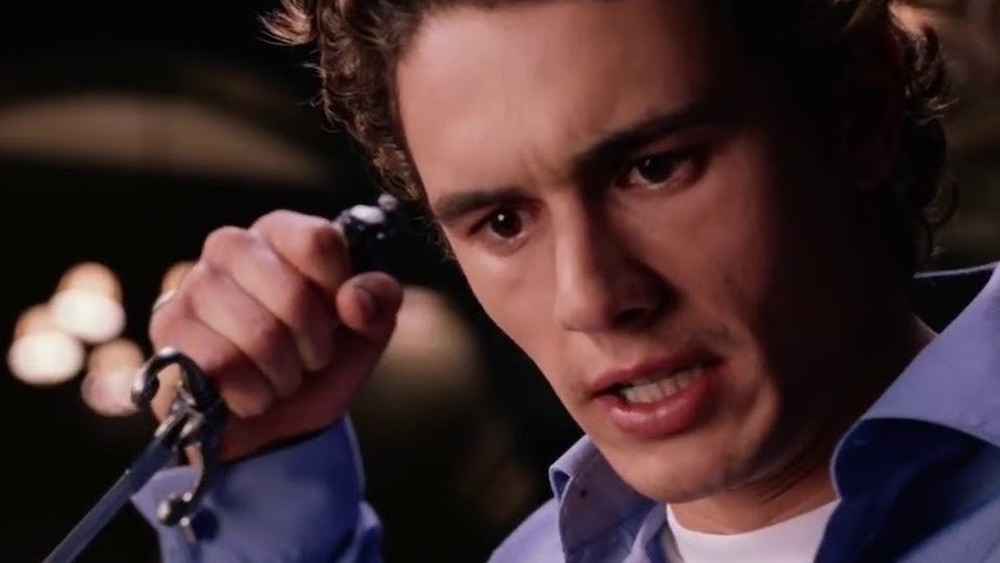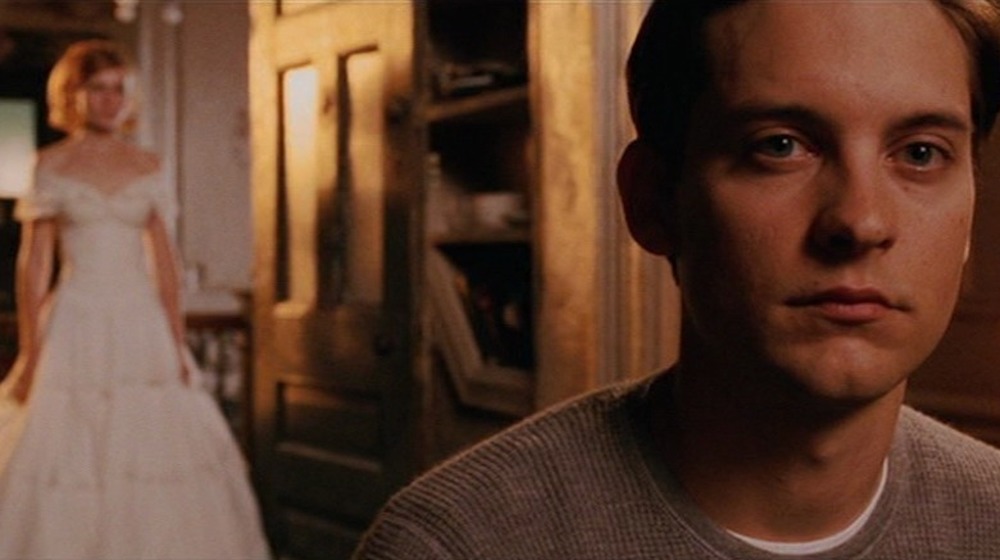The Ending Of Sam Raimi's Spider-Man 2 Explained
Spider-Man 2 is widely regarded as one of the best superhero movies ever made, and rightly so — because it elevates everything that made the first film by Sam Raimi so great. The real-world issues faced by Peter Parker (Tobey Maguire), as presented in the film, are all-too relatable, as he struggles to pay rent or study for his degree, while simultaneously trying to win the heart of one Mary Jane Watson. Of course, this grippingly human story is neatly told alongside a thrilling dose of superheroic action, as Maguire's webslinger faces off against Dr. Otto Octavius (Alfred Molina), AKA Doctor Octopus, a brilliant scientist who becomes a citywide menace following a science experiment gone wrong.
Spider-Man 2 is arguably the high point of the franchise, and the way it teaches Peter Parker a lesson about sacrifice and the weight of his responsibility — particularly through the villains of the film, including both Harry Osborn (James Franco), as well as that aforementioned supervillain with four mechanical arms — is a big part of that. These deeper themes are most powerfully demonstrated through the film's ending, as we explain below.
The redemption of Doctor Octopus
Otto Octavius is an excellently written villain, because he has both understandable motivations, and a genuine drive to do good. His original desires — to create renewable energy — are noble, and intended for the sake of benefitting the planet, even if they get twisted following his wife's death. Much like Peter, he was trying to think of others instead of himself — because if we follow Uncle Ben's teachings, having the means and power to help other people gives you a responsibility to do so.
Then his inhibitor chip — which stops the A.I. in the arms from getting into his head — gets fried during the experiment, and he winds up committing robberies, and murdering people, to finish his experiment. There's no question that he's misguided, but it's easy to see the parallels to Peter Parker, in that he becomes so determined to help the rest of the world that he doesn't let anything get in his way, including Spider-Man (or the fact that his experiment, on both occasions, becomes wildly dangerous to the city at large). In Ock's mind, even kidnapping Mary Jane is a necessary evil on the road to potential greatness.
However, as the ending proves, the weight of Octavius' ego doesn't mean he's incapable of owning his own mistakes. Spider-Man 2 is a film where the recurring theme is about the gifts we all have, and the responsibility that they come with: thus, in the final battle, as the reactor threatens New York City, Peter unmasks and repeats the advice Octavius gave him earlier in the film — that his intelligence is "a gift, not a privilege" to be used "for the good of mankind." These words hit Octavius with a moment of clarity. The weight of his grief over his wife's death has caused him to lose his way — much like Uncle Ben's death nearly got the better of Peter in the first film — but he sees the error of his ways. So, by sacrificing himself to plunge the reactor into the water, he accepts that this was his problem to fix, taking full responsibility for his actions.
Harry Osborn plunges into darkness
Unfortunately, while Ock redeems himself, the end of Spider-Man 2 shows that Harry Osborn's life is about to get a lot more complicated. By this point, he's already so overwhelmed with grief and rage (at the thought of Spidey murdering Norman Osborn at the end of the first film) that he aligned himself with a supervillain, and his final scene shows him willing to look past the fact that his dad was the Green Goblin ... but like father, like son, eh? Harry's whole arc in Spider-Man 2 is about pushing him to a place where he will truly follow in Willem Dafoe's footsteps. He even takes a position at Oscorp, subconsciously wanting to live up to the legacy Norman had built.
The gap became Harry and Peter becomes cavernous when the former unmasks the wallcrawler, only to find out that his hated enemy is also his best friend.
In regard to Spider-Man 2's themes of gifts and responsibility, Harry's arc is a cautionary tale. He inherits all this money and power from his father, and what does he do? Invests in an experiment, out of hope that it would win a Nobel Prize — and then, he spends the rest of the film becoming hostile, and warped by his own hatred. Much like Otto, Harry's grief manifests itself in a destructive manner. He could've been a real force for positive change in New York, but in the end, when he discovers a stash of Green Goblin weaponry, he instead lets his lust for revenge take over, dooming him to follow in Norman's footsteps.
Peter Parker grows up, and accepts his responsibility
Ah, the old "Parker luck." If Peter Parker is happy, you can put money on something coming along and upending his life. Spider-Man 2 sees him not only find something of a father figure in Otto Octavius, but also pushes him closer to Mary Jane, and even teases him with the possibility of a normal life, only for all these things to blow up around him. By the end, the events of the sequel force him to confront the idea that his — *ahem* — great responsibility to New York means he can't always have what he wants.
Even when his powers falter, and he briefly gets a break, he struggles with always feeling the call to action. Pete's reluctance to be honest with MJ all stems from a heart-to-heart he has with Aunt May about how sometimes responsibilities get in the way of individual dreams. The parallel, here, is that Spider-Man's obligation to help everyone will always outweigh Peter's dreams, and perhaps even prevent him from being with the one he loves.
However, Spider-Man 2's ending also acknowledges that, alongside the responsibility that people have, you also can't completely sacrifice your own needs and happiness just to exclusively focus on strictly living for those responsibilities. This is demonstrated by MJ's choice — once she knows that Peter is Spider-Man — to walk away from her relationship with John Jameson, and pick Peter instead. By doing this, Mary Jane accepts that she has to share Pete with the rest of New York: in fact, the film ends with him leaping out of the window to save lives. Because of these amazing abilities and the moral duty they come with, the couple has to sacrifice any hope of a normal life. But that doesn't mean they can't find happiness in doing so.
Superheroes. Complicated bunch, eh?



